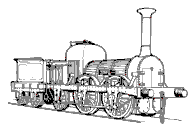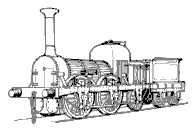
Railway Biographies
Items selected: Total cost:
John Weston [Publisher: Oakwood 2012] Softback 206 pages
A personal account of a life on the railway in and around Derby. Starting as an engine cleaner in 1937 but being laid aside a year or so later, 1939 saw the railways recruiting again and his railway career started again. From cleaner to driver all written up in a thoughtful style and describing in some detail the working practices and railway landscape that he encountered.
Klaus Marx [Publisher: Oakwood 2005] Softback 160 pages
An intriguing biography of the man who was appointed CME of the London Brighton and South Coast Railway in 1903. Best remembered in locomotive terms for his "Atlantics", this book reveals a railway career that was fraught with difficulty towards its end. Poor labour relations and rumours about misappropriation of company property dogged Marsh and in 1910 he retired early on the grounds of ill health. He subsequently worked for the Rio Tinto company and eventually settled in Bath, passing away in 1933. Coincidentaly I recently met his Grandson at a friend's 60th birthday party, a surprisingly close relation to events of so many years ago.
J.E. Chacksfield [Publisher: Oakwood 2005] Softback 168 pages
The story of the professional careers of two uncompromising brothers, Dugald and Peter, whose railway careers culminated in positions of CME and locomotive superintendant of the LSWR and G&SWR respectively. By all accounts Dugald was the dominant of the two, with a better record of successful designing and management - he oversaw the move of the locomotive works from Nine Elms to a "green field" site at Eastleigh for example, but the younger brother also made his mark. The story reveals a strange aversion to superheating and the perpetuation of some superfluous design complications to the end, which in the case of Dugald was somewhat self imposed and bizarre - not a man to take advice!
Harold Gasson [Publisher: Crecy 2020] Softback 384 pages
Subtitled "A railwayman's journey from footplate to signal box 1941 - 1957" this is a very welcome reprint of what were four OPC softback books describing the railway life of Harold Henry Gasson, a railwayman who started with the GWR at Didcot in the locomotive department and finished his railway career as a signalman. The four original books were called; "Firing Days", Footplate Days", Nostalgia Days" and "Signalling Days". This is a well written, detailed and enjoyable record of how it was on the Western in the age of steam, complete with a good selection of relevant photographs bound into the centre of the book.
J.E. Chacksfield [Publisher: Oakwood 2004] Softback 176 pages
Hitherto best known for his design work on the rebuilding of Bulleid Pacifics, this book reveals that Ron Jarvis played a key part in a large number of key motive power developments on British Railways. His breadth of experience from starting as a privileged apprentice on the LMS in 1928 was wide and being an accomplished photographer he recorded much of what he was involved in, the results of which are used to illustrate this book to great effect. Greater recognition was surely denied him by Nationalisation and its subsequent reverberations, he was evidently a first class engineer and well thought of by those who had contact with him. He certainly enjoyed an extremely full life and witnessed huge changes within British Railways, which this well researched book illustrates and comments upon well.
Peter Grafton [Publisher: Oakwood 2005] Softback 144 pages
Achieving the position of CME of the North Eastern Railway in 1910, Raven was seconded to the Woolwich Arsenal for the duration of the War before resuming his position on the North Eastern until grouping. Despite apparently designing a poor pacific late in his career, he is best remembered for pioneering development of electric traction. The sources for this book are quite "remote" from the man but a believable picture is drawn, and the illustrations and descriptions of railway development over his life are well done. I do however feel that the profile written by an industrial psychologist in the absence of any first hand account of the subject's character is somewhat fatuous and would have been better left out.